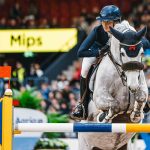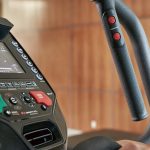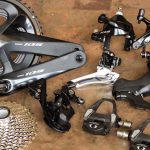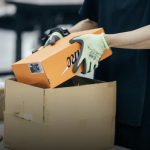Amer Groups net sales were 293.4 million ($366.5 mm) for the 2004 first quarter, a 4.3% increase from Q1 2003 sales of 281.2 million ($301.7 mm). EBIT increased 126.7% to 46.7 million ($58.3 mm) from 20.6 million ($22.1 mm) in the year-ago period. Excluding a one-time benefit from the sale of the Tobacco business, EBIT would have increased 39.3% to 28.7 million ($35.9 mm). Net profit was up 133.6% to 30.6 million ($38.2 mm) and diluted EPS gained 134.5% to 1.29 ($1.61) from 0.55 (59¢) in the year-ago period.
With the exception of Suunto, sales of all sports equipment business areas grew. First quarter sales figures compared to 2003s have been boosted by earlier deliveries this year. During the last quarter of 2003, there were some signs of a
strengthening of demand for sports equipment, and this year activity has started more positively in the sports equipment market.
The Golf Divisions year started well with net sales in Q1 growing 16.3% compared to Q1 2003 and EBIT was positive versus a year-ago loss. Due to the seasonality of the golf market, the second quarter is critical to golf sales for the year as a whole. Both the Racquet Sports and the Team Sports Divisions continued to perform well. In Winter Sports, the season was reaching its end. However, sales increased markedly
compared to 2003, when the Austrian and German winter sports markets were depressed by lack of snow at the beginning of the season. The Fitness Equipment Division continued to grow and net sales increased by 7%. Suuntos net sales were impacted by a decline in sales of its non-core products.
Net sales by geographical market were as follows: Americas (including Latin America) 60%, EMEA (Europe, Middle-East, Africa) 32% and Asia Pacific 8%. Sales grew by 4% in the Americas, by 6% in EMEA and by 2% in Asia Pacific.
In local currencies, net sales in the Americas grew by 19%, in EMEA by 7% and in Asia Pacific by 7%. The Groups EBIT totaled EUR 46.7 million (2003: EUR 20.6 million). EBIT includes the consideration received from Philip Morris for the premature termination of the manufacturing and marketing license for Philip Morris products. The positive impact on Amers EBIT in the first quarter of 2004 was 18.0 million ($22.5 mm). The reorganization of Wilsons US businesses which started in April 2003, and associated adjustment of Wilsons cost structure to correspond to prevailing business, also improved the Groups EBIT in the first quarter.
Foreign exchange rate movements reduced net sales by 23.0 million ($28.3 mm), due to the strengthening of the euro especially against the U.S. dollar. The impact on EBIT was slightly negative. Return on capital employed (ROCE) was 25.9% (12 months rolling average) versus 19.3% in the year-ago period.
DIVISIONAL REVIEWS
Racquet Sport Division net sales increased 4.8% to 58.7 million ($73.3 mm) from 56.0 million ($60.1 mm) in the year-ago quarter. EBIT jumped 84.6% to 7.2 million ($9.0 mm) compared to 3.9 million ($4.2 mm) in Q1 2003. In local currencies, the Racquet Sports Divisions net sales grew by 13% and increased 22.1% when measured in U.S. dollars.
Sales grew in the Americas by 17%, in EMEA by 8% and in Asia Pacific by 12%.
Sales of Wilson tennis rackets increased 8%. Sales grew particularly within the premium tennis racket segment. The Series H racket models which were brought to the market in 2003 continued to be popular. Sales of tennis balls increased 19% and footwear 5%.
Amer said that Wilson is the best-selling brand in North America and
Japan and is the No. 2 brand Europe. In tennis balls Wilson is No. 3 in the world according to the company.
Golf Division net sales increased 16.3% in Q1 to 48.6 million ($60.7 mm) from 41.8 million ($44.8 mm) in Q1 2003. Amer swung to positive EBIT in the division in the first quarter, posting a 3.2 million ($4.0 mm) versus an EBIT of -1.2 million (-$1.3 mm) in the year-ago period.
Net sales in local currencies grew by 24%. Sales grew by 32% in the Americas, by 12% in EMEA and by 21% in Asia Pacific.
Sales of Wilson golf clubs increased 23% and sales of golf balls by 14%. Product has been delivered to the trade more smoothly than in 2003 when sales were depressed by delayed shipments of new products in the spring.
The Golf business thus returned to profitability thanks to these sales increases and the restructuring of Wilsons US businesses, which began last year. Profitability was however dampened by a decline in average selling prices. The reorganization of Wilson and associated adjustment of its cost structure to correspond to prevailing business conditions is expected to yield savings of about $12 million in 2004. Most of these savings will benefit the Golf Division. As part of this reorganization, Wilsons remaining golf club and bag assembly operations in the U.S. were outsourced at the beginning of 2004.
Team Sports Division net sales declined 1.1% when measured in the reporting Euro currency to 61.5 million ($60.7 mm) compared to 62.2 million ($66.7 mm) in the year-ago period. In U.S. dollar terms, the division actually posted a sales increase of 15.1% in the quarter. EBIT for Team Sports gained 7.9% to 12.3 million ($15.4 mm) from 11.4 million ($12.2 mm) in Q1 2003.
In local currencies, the Team Sports Divisions net sales grew by 14% and EBIT by 26%. Outside the United States sales grew by 5%. The fastest growing product categories in Team Sports were basketballs (43%) and American footballs (31%). Sales of baseball and softball bats grew by 21%, driven by the continued success of
distributing DeMarini product globally. Sales of baseball gloves declined 12%.
Sales were also boosted by the acquisition of Athletic Training Equipment Company Inc. (ATEC) in November 2003. ATECs yearly net sales are around $11 million. The integration of ATEC into the Team Sports Division has proceeded well.
Winter Sports Division net sales grew 11.6% to 28.9 million ($36.1 mm) from 25.9 million ($27.8 mm) in Q1 2003. The divisions seasonal EBIT loss widened 41.7% to -5.1 million (-$6.4 mm) versus -3.6 million ($3.9 mm) in Q1 last year.
Winter Sports net sales in local currencies grew by 15% compared to the first quarter of 2003 when the winter sports markets in Austria and Germany were suffering from poor snow conditions at the beginning of the 2002/2003 winter sports season. In line with its business cycle, the Winter Sports Divisions deliveries are heavily weighted towards the latter part of the year, the busiest months for deliveries being September and October.
Sales grew by 30% in EMEA and by 12% in the Americas. Sales of alpine skis grew by 11%. EBIT was weakened by a decline in average selling prices. Also, there was some investment in strengthening the distribution network, especially in Japan.
The Company estimates that the global winter sports market grew slightly in the 2003/2004 season. The European trades inventory levels are mostly at normal levels, but in North America and Japan dealers are reporting higher inventories than last year.
Pre-orders in volume terms have progressed according to plan. Prices are expected to continue to come under pressure also in the coming winter sports season.
Fitness Equipment net sales were 55.1 million ($68.8 mm) in the first quarter, a 7.2% increase over the 51.4 million ($55.1 mm) figure posted in the year-ago quarter. EBIT was up 6.7% to 9.5 million ($11.9 mm) from 8.9 million ($9.5 mm) in Q1 last year.
Fitness Equipments net sales in local currencies increased 23% and EBIT increased 23%. The fastest growing product categories were elliptical cross-trainers, especially cross-trainers for home-use. Outside the Americas sales grew by 16%.
Cardio Theaters operations are profitable, whereas ClubCom is still in an unprofitable development stage. The integration of both FPI and ClubCom into Precor has proceeded well.
Sports Instruments Division net sales declined 6.5% in the quarter to 18.8 million ($23.5 mm) from 20.1 million ($21.6 mm) in the year-ago period. EBIT also declined in the period to 1.8 million, a decrease of 18.2% versus EBIT of 2.2 million in the year-ago period.
In local currencies, Suuntos net sales declined by 4%. Geographically, sales declined by 4% in EMEA and by 6% in the Americas. Sales fell due to the decline of sales of Suuntos noncore product groups. Sales of Suuntos wristop computers grew by 9%. Sales of Suuntos diving instruments grew by 2%. Wristop computers and diving instruments accounted for 61% of Suuntos net sales.
In January 2004, Philip Morris and Amer Tobacco Ltd reached an agreement on the premature termination of the latters manufacturing and marketing license and on the sale of certain assets. The consideration received from Philip Morris was 29.0 million and the positive impact on Amers EBIT in the first quarter of 2004 was
18.0 million. Amer Tobacco's factory premises were not included in the deal. The transaction has received approval from the relevant competition authorities.
The Group employed 4,046 people at the end of the period under review compared to 4,085 at the year-end and an average of 4,177 during the period. At the end of the period, a total of 1,781 were employed in the U.S., 651 in Austria, 370 in Finland and 1,244 in the rest of the world.















